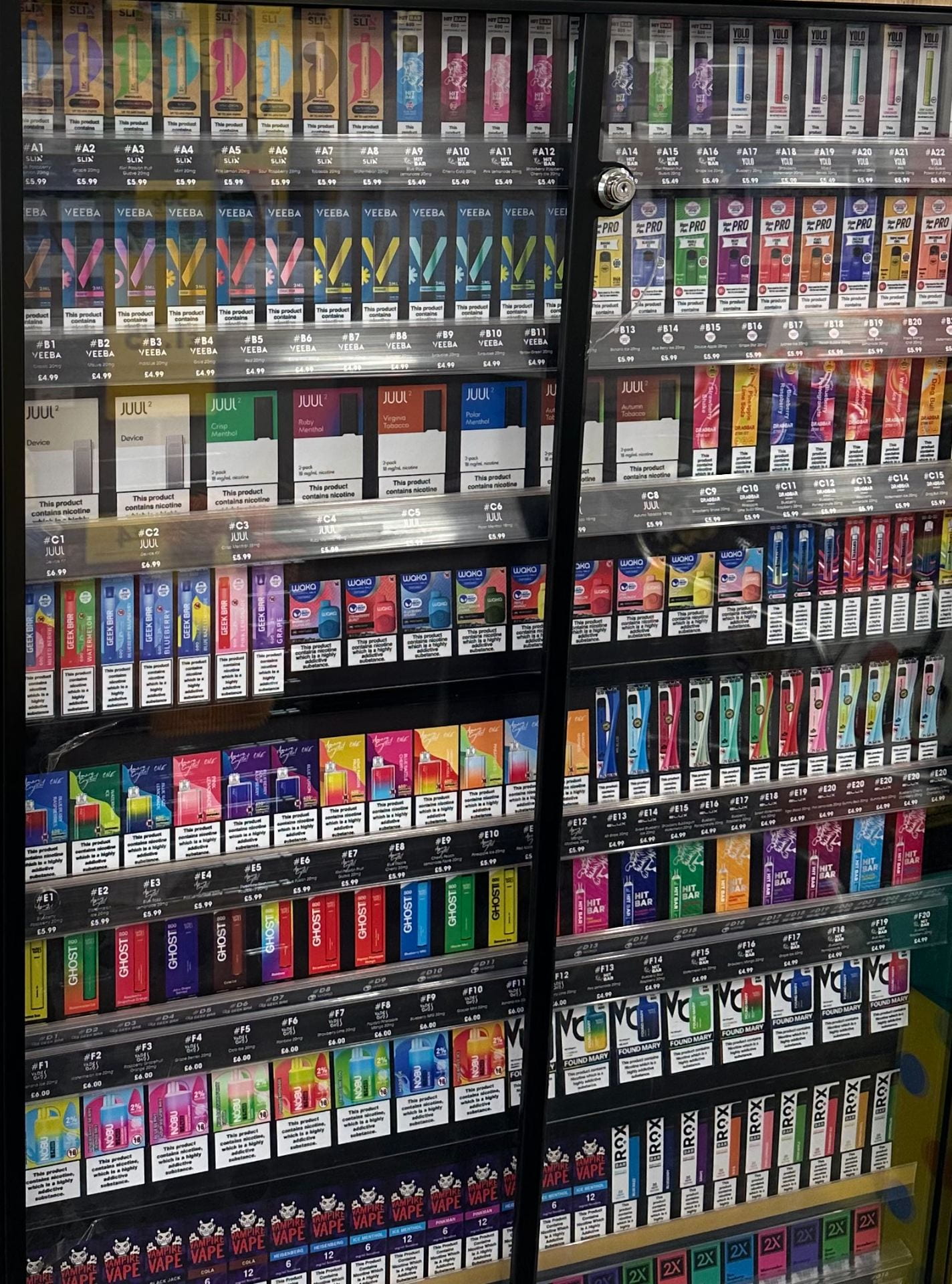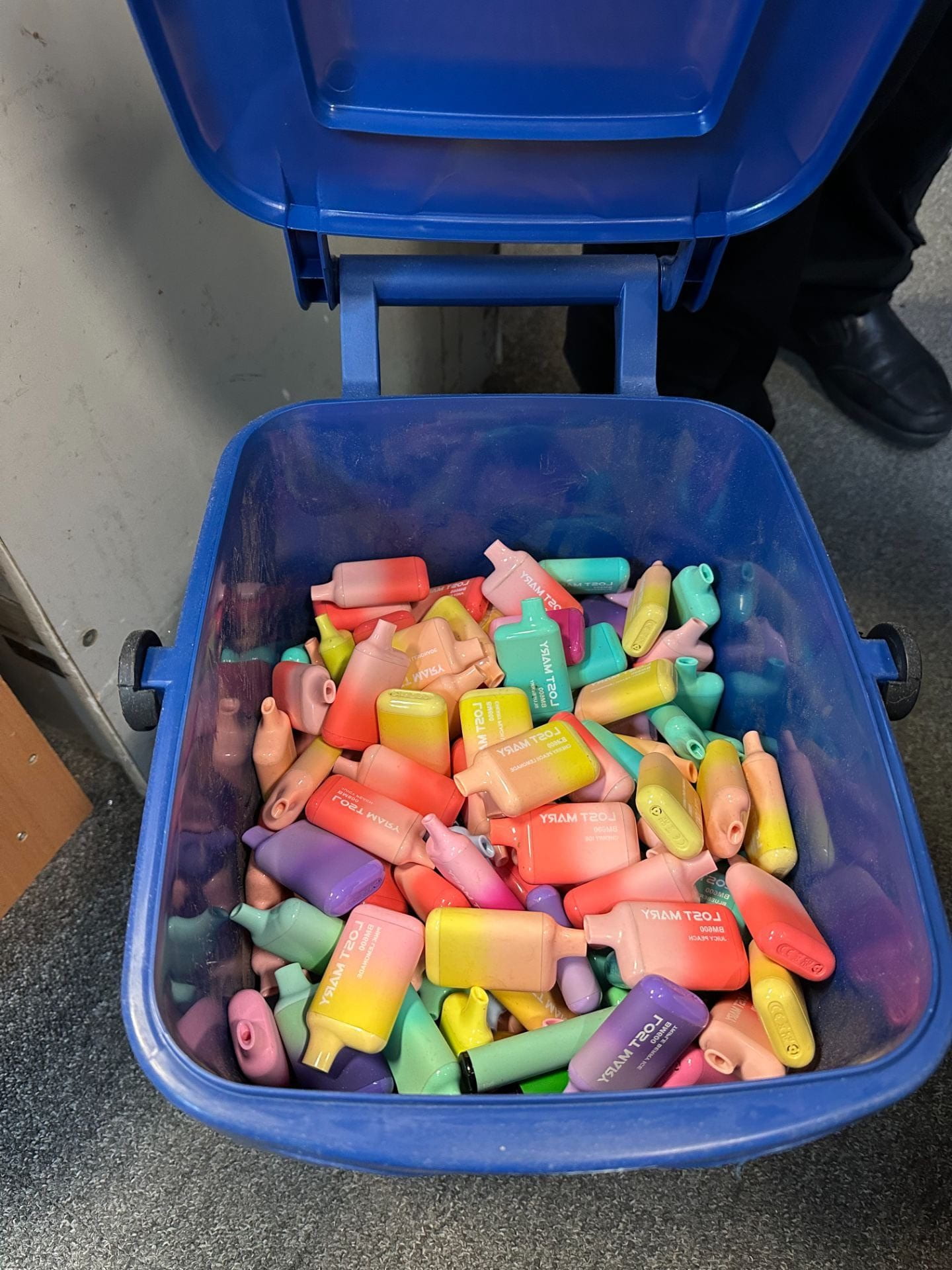
There are now nearly 5 million single-use vapes discarded or thrown away each week, causing increased fire risks across the UK.
This number has quadrupled in the most recent data gathered by Material Focus (MF) who conducted the latest calculations for YouGov research, published in September 2023, and is the equivalent to 8 vapes per second being thrown away.
Discarded vapes, which contain lithium batteries, have seen an escalation in fires across the country in refuse lorries, recycling centres, and people’s homes, potentially causing a risk to life and increasing insurance premiums.
Executive Director of MF Scott Butler said: “Since we last published our research the problem with single-use vapes has gotten further out of control. Single-use vapes are a strong contender for being the most environmentally wasteful, damaging, and dangerous consumer product ever made.”
He went on to say that there are ‘still very few producers and retailers who comply with environmental regulations to those who haven’t put re-cycling drop-off points and systems in place’, and that ‘we need proper financing of genuine recycling solutions to recover materials and manage fire risks’.
The e-cigarettes containing the lithium-ion batteries are deemed safe for daily use at the moment but they do present a very real fire risk when they are over-charged, exposed to high temperatures, submerged in water, short-circuited, or damaged and therefore, can be a potential hazard when thrown away with everyday rubbish.
There have been cases of the vape batteries exploding if they short while in use and have caused injury or burns where they have been put into trouser or coat pockets.
Dedicated recycling bins containing the mineral vermiculite are used to reduce the fire hazard, and when full, they are taken to special recycling servicing areas to be dismantled by hand.
Any shop selling vapes, by law, must provide these bins to enable consumers to return them, but many of the retailers do not have them due to the extra cost for the facility.
With a lack of legislative knowledge and funding many retailers are still unaware of their legal obligation to do this, and those that do provide them are hesitant to advertise the fact, as they should, because the vape recycling bins are small and would need to be replaced more regularly.

Julie-Anne of Saltash News in South East Cornwall said: “We do have the required recycling bin for vapes but don’t tell our customers that we have this facility although if they ask then, of course, we let them know. This is because the bins for fire hazardous lithium batteries and vapes cost us as retailers around £300 a time, and because they are so small, they fill up quickly so would need replacing more often.
“We didn’t even know initially that there was a legal requirement to have one, as the suppliers had never told us. We found this out for ourselves.”

Ian, her colleague, added: “We get an uptake of about 20 customers a week recycling their vapes out of around 200 people per week purchasing them, so there is only a 10% return.”
Vape stores not providing the recycling facilities appear to have no knowledge that they have a legal responsibility to do so.
Josh, who works at Jammy Vapes in Saltash said: “We do our best to advise people about responsible disposal of the vapes but obviously we can only do that as far as they are willing to listen, and it is ultimately the customer’s responsibility.
“We only sell the rechargeable e-cigarettes here and explain to the people buying them that if they buy alternative chargers to those we recommend with the product, that there will be a danger of the product shorting, but some people don’t want to pay the extra and will buy one cheaper online.”
He explained that they had stopped selling the disposable vapes due to the problems being caused with them being discarded irresponsibly.
He added: “If people are not willing to recycle a normal battery, why would they be willing to recycle a vape battery?”
The information on the e-cigarettes is minimal, and the warning on the actual lithium battery is tiny, although there is a small image suggesting ‘not to discard with household waste’.

The only formal training Josh had received was regarding the normal ID regulations that people selling cigarettes must abide by, and they should treat the vapes as though they were a tobacco product. He had not been told about the necessity of recycling bins by the store owner.
No evidence was visible in either store in the form of advertising, warning of the fire hazards posed by damaged lithium batteries or to suggest they should be recycled responsibly.
With the fundamental message still not getting across about the significant risks to people who use e-cigarettes, MF have called for ‘a major communications campaign to raise public awareness’ and ‘immediate, significant and transparent vape industry voluntary action on a comprehensive and widely accessible take-back and recycling solution’.
In addition to this they suggested that a kerbside recycling service could help, with 50% of people in their research saying they would use this service if it was available.

Lucy from Plymouth said that she only knew about the fire risk with vape batteries from what she had seen on social media but still disposed of her vapes in the bin. She said: “I haven’t seen any advertising of how or why vapes should be recycled but I assume they can just be taken and put into the supermarket battery bins. I didn’t realise they could cause fires after being disposed of until now so I would consider taking them to be recycled in the future.”
Two other ladies, Hayley and Emma from the area also discard their vapes in the household waste. Hayley said: “If I knew where they could be recycled, I would take them in bulk. They are normally saved up in my car before throwing them away.”
The fire risk from vapes has wider implications, too, with insurers Zurich Municipal also voicing their concerns. The insurance company have also called for the government to introduce a fully funded kerbside collection service and have stated they would also like to see a national campaign to raise awareness of the necessity to safely dispose of vapes.
In a press release from them, Lord Foster of Bath, who has been calling for tighter regulation on lithium batteries, said: “As lithium batteries become increasingly integrated into our everyday lives, it is crucial that we recognise and address the potential hazards they pose. Discarded incorrectly, single use vapes are a ticking time bomb. With millions of lithium batteries ending up in general waste every week, the government needs to act to protect people’s safety and the environment.”
In a debate pack prepared for the House of Commons at the end of November 2022 an Institution of Environmental Management Assessment (IEMA) article was referred to which underlined the uncertainty of how disposal vapes should be dealt with and stated that it was unclear whether the then regulations even applied to products containing batteries like disposable vapes. It said: ‘Some vape companies have already asked consumers to give back their used disposable vapes. An issue with this, though, is the lack of widely available recyclers in the UK who are able to take them from vape shops to recycling facilities.
At the end of March 2023, however, the Office for Product Safey and Standards began taking enforcement action against retailers who are non-complaint of the WEEE regulations (Waste, Electrical and Electronic Equipment). This essentially highlighted the dangers posed by e-cigarettes and meant that any retailer selling under £100,000 of Electrical and Electronic Equipment (EEE) should sign up to a Distributor Takeback Scheme. There is a charge for this, and it also requires a shop to display signage in store, as well as them having to keep a record of the information they give customers as to where they should go to recycle their goods and their own take back scheme.
In the August 2023 updated version for EEE, vapes were listed in category 7 (toys, leisure, and sports equipment) of the guidelines. It indicates that an individual, a corporate body such as a company, as well as not-for-profit-organisations are responsible for reporting that the product ‘has been placed on the market’.
With much research and many surveys now having been undertaken it highlights that there is still more to be actioned, particularly in educating people about the very real risks and the need of extra funding and facilities to be readily available in helping to eradicate the potential hazard of yet more fires.
Risk expert at Zurich Municipal Alix Bedford said following their survey: “While councils have long battled the nuisance of cigarette litter, single use vapes are emerging as an altogether more complex and hazardous problem. Flammable lithium batteries inside vapes pose a hidden danger to waste and recycling workers and are causing costly damage and disruption to waste management services.
“With house fires sparked by disposable and rechargeable vapes also on the rise, the government must take a lead in driving consumer awareness to curb this growing threat.”
